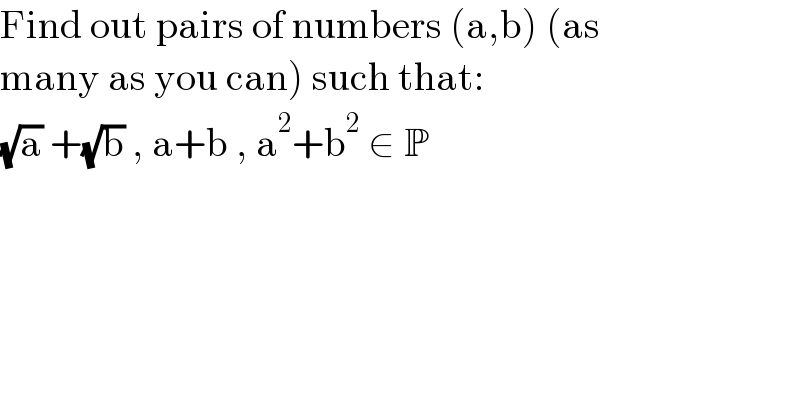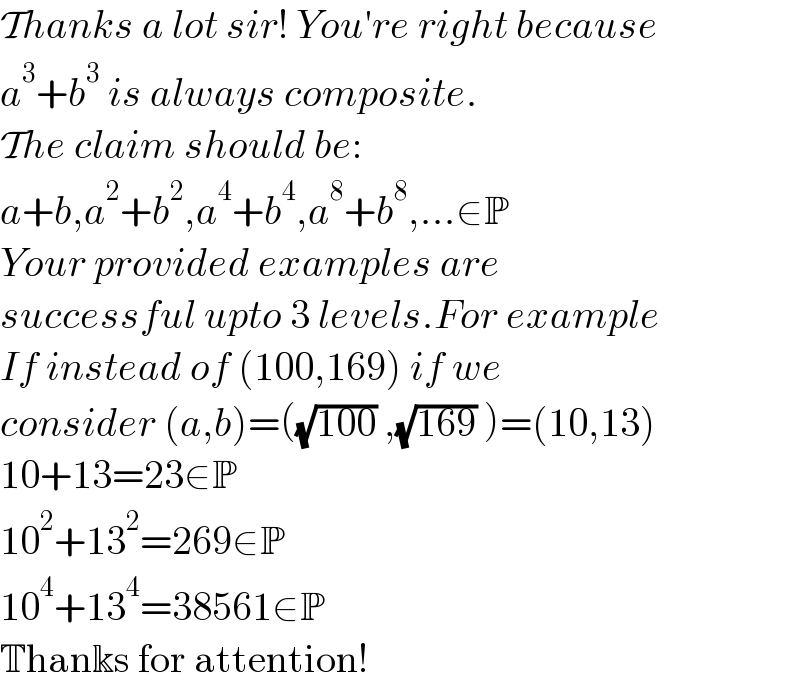
Question Number 159925 by Rasheed.Sindhi last updated on 22/Nov/21

$$\mathrm{Find}\:\mathrm{out}\:\mathrm{pairs}\:\mathrm{of}\:\mathrm{numbers}\:\left(\mathrm{a},\mathrm{b}\right)\:\left(\mathrm{as}\right. \\ $$$$\left.\mathrm{many}\:\mathrm{as}\:\mathrm{you}\:\mathrm{can}\right)\:\mathrm{such}\:\mathrm{that}: \\ $$$$\sqrt{\mathrm{a}}\:+\sqrt{\mathrm{b}}\:,\:\mathrm{a}+\mathrm{b}\:,\:\mathrm{a}^{\mathrm{2}} +\mathrm{b}^{\mathrm{2}} \:\in\:\mathbb{P} \\ $$
Answered by nikif99 last updated on 23/Nov/21

$${Pairs}\:\left({a},\:{b}\right)\:{up}\:{to}\:\mathrm{121}: \\ $$$$\left(\mathrm{4},\:\mathrm{9}\right),\:\left(\mathrm{4},\:\mathrm{25}\right),\:\left(\mathrm{9},\:\mathrm{64}\right),\:\left(\mathrm{25},\:\mathrm{64}\right),\: \\ $$$$\left(\mathrm{36},\:\mathrm{121}\right),\:\left(\mathrm{49},\:\mathrm{100}\right),\:\left(\mathrm{81},\:\mathrm{100}\right). \\ $$
Commented by Rasheed.Sindhi last updated on 23/Nov/21

$$\mathbb{T}\mathrm{han}\Bbbk\mathrm{s}\:\mathrm{sir}! \\ $$
Commented by Rasheed.Sindhi last updated on 23/Nov/21

$$\mathrm{What}'\mathrm{s}\:\mathrm{the}\:\mathrm{maximum}\:\mathrm{value}\:\mathrm{of}\:\mathrm{n}\:\mathrm{for} \\ $$$$\mathrm{which}\:\mathrm{a}+\mathrm{b},\mathrm{a}^{\mathrm{2}} +\mathrm{b}^{\mathrm{2}} ,\mathrm{a}^{\mathrm{3}} +\mathrm{b}^{\mathrm{3}} ,...,\mathrm{a}^{\mathrm{n}} +\mathrm{b}^{\mathrm{n}} \in\mathbb{P} \\ $$
Commented by Rasheed.Sindhi last updated on 23/Nov/21

$$\mathrm{Or}\:\mathrm{if}\:\mathrm{m}<\mathrm{n},\mathrm{what}\:\mathrm{is}\:\mathrm{the}\:\mathrm{maximum}\:\mathrm{value} \\ $$$$\mathrm{of}\:\mathrm{n}−\mathrm{m}\:\mathrm{for}\:\mathrm{which} \\ $$$$\mathrm{a}^{\mathrm{m}} +\mathrm{b}^{\mathrm{m}} ,\mathrm{a}^{\mathrm{m}+\mathrm{1}} +\mathrm{b}^{\mathrm{m}+\mathrm{1}} ,\mathrm{a}^{\mathrm{m}+\mathrm{2}} +\mathrm{b}^{\mathrm{m}+\mathrm{2}} ,...,\mathrm{a}^{\mathrm{n}} +\mathrm{b}^{\mathrm{n}} \in\mathbb{P} \\ $$
Commented by nikif99 last updated on 23/Nov/21

$${If}\:{you}\:{omit}\:{the}\:{demand}\:\sqrt{{a}}+\sqrt{{b}}\:\in\mathbb{P}, \\ $$$${the}\:{number}\:{of}\:{acceptable}\:{pairs}\: \\ $$$${increase}\:{enormously}. \\ $$$${Nevertheless},\:{max}\left({n}\right)\:{seems}\:{to}\:{be}\:\mathrm{2}. \\ $$$${P}.{S}.\:{Another}\:{pair}\:{till}\:\mathrm{200}:\:\left(\mathrm{100},\mathrm{169}\right). \\ $$
Commented by Rasheed.Sindhi last updated on 23/Nov/21

$$\mathcal{T}{hanks}\:{a}\:{lot}\:{sir}!\:{You}'{re}\:{right}\:{because} \\ $$$${a}^{\mathrm{3}} +{b}^{\mathrm{3}} \:{is}\:{always}\:{composite}. \\ $$$$\mathcal{T}{he}\:{claim}\:{should}\:{be}: \\ $$$${a}+{b},{a}^{\mathrm{2}} +{b}^{\mathrm{2}} ,{a}^{\mathrm{4}} +{b}^{\mathrm{4}} ,{a}^{\mathrm{8}} +{b}^{\mathrm{8}} ,...\in\mathbb{P} \\ $$$${Your}\:{provided}\:{examples}\:{are}\: \\ $$$${successful}\:{upto}\:\mathrm{3}\:{levels}.{For}\:{example} \\ $$$${If}\:{instead}\:{of}\:\left(\mathrm{100},\mathrm{169}\right)\:{if}\:{we} \\ $$$${consider}\:\left({a},{b}\right)=\left(\sqrt{\mathrm{100}}\:,\sqrt{\mathrm{169}}\:\right)=\left(\mathrm{10},\mathrm{13}\right) \\ $$$$\mathrm{10}+\mathrm{13}=\mathrm{23}\in\mathbb{P} \\ $$$$\mathrm{10}^{\mathrm{2}} +\mathrm{13}^{\mathrm{2}} =\mathrm{269}\in\mathbb{P} \\ $$$$\mathrm{10}^{\mathrm{4}} +\mathrm{13}^{\mathrm{4}} =\mathrm{38561}\in\mathbb{P} \\ $$$$\mathbb{T}\mathrm{han}\Bbbk\mathrm{s}\:\mathrm{for}\:\mathrm{attention}! \\ $$
Commented by nikif99 last updated on 23/Nov/21

$${Excellent}\:{post}!\:{Thank}\:{you}\:{too}. \\ $$
Commented by Rasheed.Sindhi last updated on 24/Nov/21
��������
